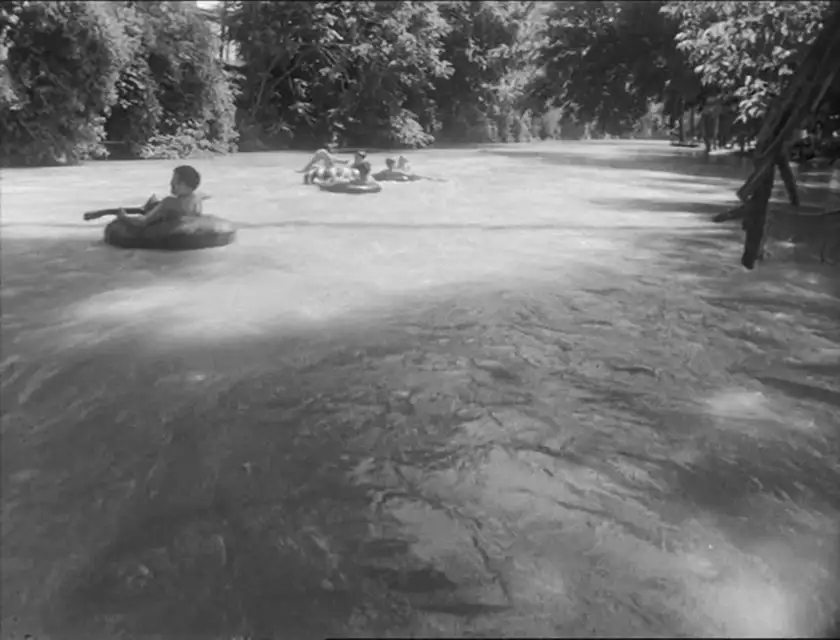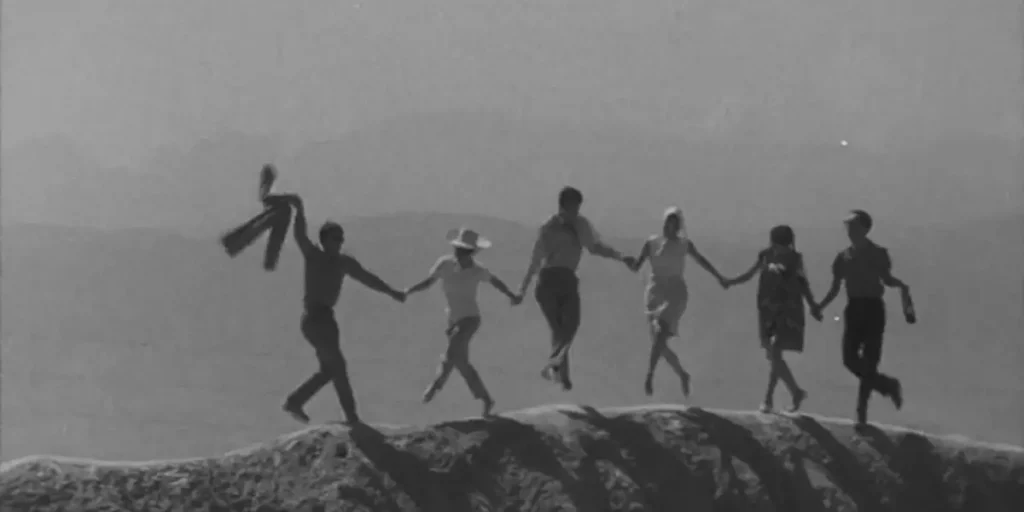Tenderness (1967) freewheels through and around the city of Tashkent, presenting three slices of life from one youthful summer.
Tenderness (Nezhnost) (1967) is a summer-set, Uzbek, perfectly-titled film, ordered in three parts. The first part follows a boy named Sandzhar (Ravshan Agzamov) and his friends as they run through the streets in their shorts – wheeling along inflatable tyres, and as they then jump off a bridge, and drift lazily down-river.
The movie, with its innocent characters, joyous music, and summertime brightness, immediately (and then continuously) triggered an envious response from myself. Is life truly capable of this sort of free-wheeling? The camera flowing throughout the narrative, the characters bounding around their environs, the soundtrack making a dance of it all. Do I envy the people in Tenderness because the film’s striking simplicity lends them a knowable, and thus potentially shared, quality? Or, am I envious because Tenderness exhibits a hyperreality, that if nostalgic and fantastical in ‘60s Uzbekistan, is certainly unreal in 2020s England? And, more to what I think Tenderness is trying to elicit: what was I doing at that age? Was watching Resident Evil and playing Call of Duty a waste?
Still, whilst floating down-river, Sandzhar’s attention is caught by a girl – named Lena (Mariya Sternikova) – sitting on a bench, who he tentatively approaches. From there, Sandzhar really goes through it: a day spent with Lena, an instant infatuation, an inability to now think of anyone else, a new introspective silence that alienates his friends, two more chance meetings with Lena, a foolish overstepping, regret, depression, then declarations that love is a sham, and that life is no longer worth living. It’s all very obvious and childish, yet, despite that or because of it (you decide), sincere and easy to sympathise with.
Tenderness is, then, as you might have guessed, a male heterosexual’s movie. But, the value, for me, comes in it being a brooding, sentimental, wistful male heterosexual’s movie. A movie that might make one’s grandfather – who’s rarely seen to even smirk – tear up a little.
The second part follows Lena, no longer sitting on a bench, but in the countryside with a group of friends, and a lad named Timur – who fancies proposing to her. This chapter suddenly feels a little more grown-up, what with the focus now on a bunch of twenty-somethings and all, but Tenderness effectively maintains the naivety, and the innocence too.

No longer am I thinking: “what was I doing at that age?”, for I know full-well that I’ve so far spent my twenties watching movies about people in their twenties – which means I’m either too young to be watching this film or am exactly the right age to be watching this film (you decide).
I was, after this part, slightly expecting the finale of Tenderness to align with a new character older still, to really ensure itself a movie that haunts me well into my middle age, and perhaps beyond too, but it achieves this without doing so. The third chapter follows a girl named Mamura (introduced earlier, and perhaps the most innocent character out of the lot), as a certain expectation of hers is rapidly established and then subsequently flattened. Drawing to a close by setting its entire presentation of a fragile, frantic, transient life on the shoulders of young Mamura, the film concludes with a bit of an all-timer montage that reasserts the beauty of everything seen so far.
All told, Tenderness is quite a tapestry. It’s quite the perfect little summer movie, really. Maybe the next time all the windows are open, and Lawrence of Arabia (1962) is on the telly, we could watch this instead. And, isn’t it curious how the ‘mundane’ film inspires more than the epic ever could? After watching Tenderness I feel sure that I ought to be out in the world, doing something. The last time I saw Lawrence of Arabia I think I probably ate some dinner afterwards and then went to bed.
Tenderness (Nezhnost) is now available to watch on DVD.

